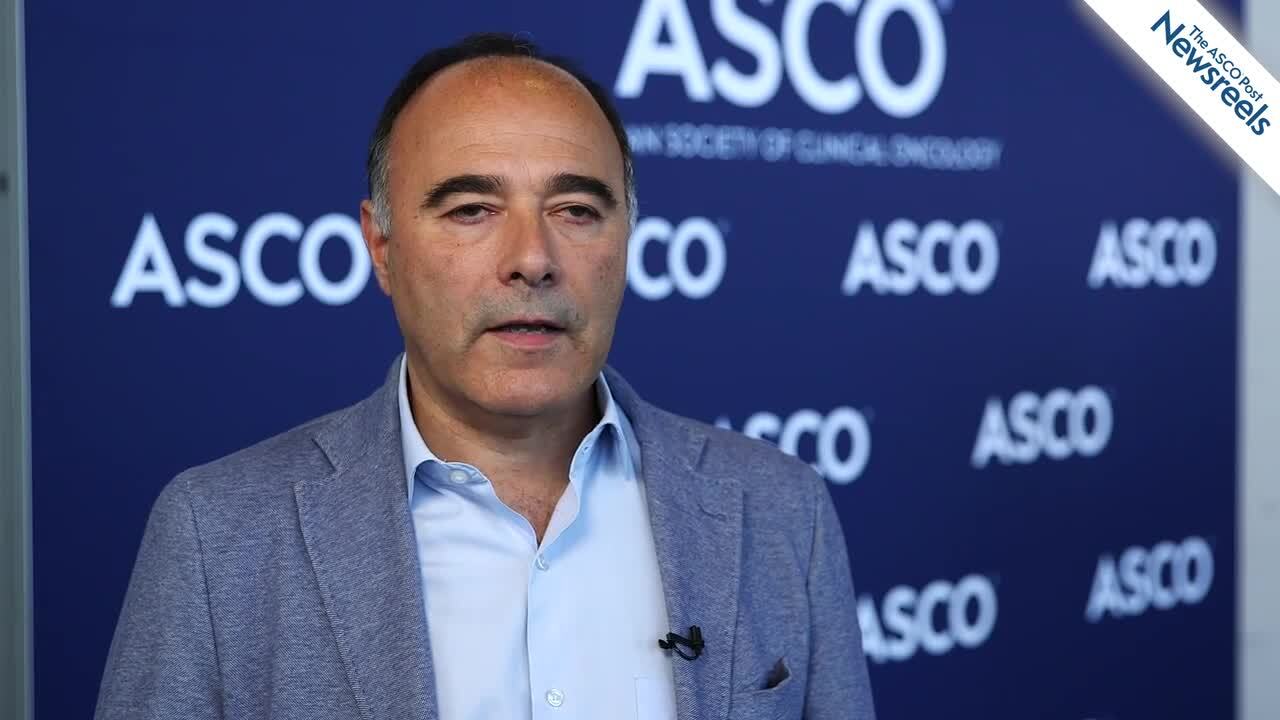Oral Antibiotics and Risk of Colon or Rectal Cancer
In an extensive data mining analysis of British medical records, researchers found that taking even a single course of antibiotics might boost—albeit slightly—the risk of developing colon cancer, but not rectal cancer, a decade later. The findings, reported by Zhang et al in Gut,...
Does Exercise Improve Outcomes in Patients With Metastatic Colorectal Cancer?
Patients with metastatic colorectal cancer who engaged in moderate exercise while undergoing chemotherapy tended to have delayed progression of their disease and fewer severe side effects from treatment, according to the results of a new study published by Guercio et al in the Journal of Clinical...
FDA Approves Entrectinib for NTRK-Fusion Cancers, ROS1-Positive NSCLC
Today, the U.S. Food and Drug Administration (FDA) granted accelerated approval to entrectinib (Rozlytrek) for adult and adolescent patients whose cancers have an NTRK (neurotrophic tyrosine receptor kinase) genetic fusion and for whom there are no effective treatments. Entrectinib was also...
Regorafenib Dose-Escalation Strategy vs Standard Dosing in Colorectal Cancer
In the phase II ReDOS trial reported in The Lancet Oncology, Tanios Bekaii-Saab, MD, and colleagues found that a regorafenib dose-escalation strategy compared favorably with standard dosing in regard to toxicity profile and activity in patients with refractory advanced colorectal cancer. Study...
Abdominal Fat and Mortality in Patients With Colorectal Cancer
For patients with colorectal cancer, new research shows a clearer connection than previously known between fat deposits in certain areas of the body and higher rates of death from all causes within 7 years of cancer diagnosis. These findings were published by Brown et al in the Journal of the...
FDA Approves Bevacizumab Biosimilar for Five Cancer Types
ON JUNE 28, the U.S. Food and Drug Administration (FDA) approved bevacizumab-bvzr (Zirabev), a biosimilar to bevacizumab (Avastin), for the treatment of five types of cancer: metastatic colorectal cancer; unresectable, locally advanced, recurrent, or metastatic nonsquamous non–small cell lung...
Becoming Acquainted With Cancer
Just weeks after my wedding in late summer of 2017, I had a sudden bout of abdominal pain so severe that it sent me to the emergency room. I was just 29 years old and in great physical shape. In the emergency room, a physician examined me and was about to release me with a prescription for a...
Features on Restaging MRI Associated With Local Recurrence After Neoadjuvant Treatment in Low Rectal Cancer
In a retrospective analysis reported in JAMA Surgery, Ogura et al found that persistently enlarged nodes in the internal iliac compartment on restaging magnetic resonance imaging (MRI) after neoadjuvant chemoradiation or radiation therapy for low rectal cancer were associated with high risk of...
Rates of Colorectal Cancer Diagnosis in Adults Younger Than Age 50
A new study published by Virostko et al in Cancer found that the proportion of adults diagnosed with colorectal cancer under age 50 in the United States has continued to increase over the past decade, and younger adults are diagnosed with more advanced disease. To determine recent trends in...
Does the Association Between Diet and Colonic Mucosa–Associated Microbiota Affect Cancer Risk?
A report published by Liu et al in The American Journal of Clinical Nutrition found an association between diet quality and microbiome composition in human colonic mucosa. The researchers found that a high-quality diet is linked to more potentially beneficial bacteria, whereas a...
Maintenance Panitumumab vs Panitumumab/Fluorouracil/Leucovorin in RAS Wild-Type Metastatic Colorectal Cancer
In an Italian phase II trial reported in JAMA Oncology, Pietrantonio et al found that maintenance panitumumab alone was inferior in terms of progression-free survival (PFS) compared to maintenance panitumumab plus fluorouracil/leucovorin in RAS wild-type metastatic colorectal cancer. Study Details ...
Rise in Early-Onset Colorectal Cancer Not Fully Aligned With Screening Trends
A new study finds that trends in colonoscopy rates did not fully align with recent increases in colorectal cancer incidence in younger adults. The findings were published by Fedewa et al in the Journal of Medical Screening. Colorectal cancer incidence rates are declining in adults older than...
ReDOS: Regorafenib Dose-Escalation Strategy in Refractory Advanced Colorectal Cancer
In the phase II ReDOS trial reported in The Lancet Oncology, Bekaii-Saab et al found that a regorafenib dose-escalation strategy compared favorably with standard dosing in regard to toxicity profile and activity in patients with refractory advanced colorectal cancer. Study...
Henry T. Lynch, MD, Trailblazer in Hereditary Cancers, Dies at 91
Henry T. Lynch, MD, widely known as “the father of cancer genetics,” had an early life that could have been lifted from the pages of a Louis L’Amour novel. He dropped out of high school and using a falsified birth certificate joined the U.S. Navy at 16 years old, serving as a gunner on a marine...
ESMO World GI 2019: BEACON CRC: Encorafenib/Binimetinib/Cetuximab Improves Survival in BRAF V600E–Mutated Metastatic Colorectal Cancer
The three-drug combination of encorafenib, binimetinib, and cetuximab significantly improved overall survival in patients with BRAF-mutated metastatic colorectal cancer, according to results of the phase III BEACON CRC clinical trial. These findings were presented by Kopetz et al at the European...
ESMO World GI 2019: REARRANGE Trial Examines Flexible Regorafenib Dosing in Refractory Metastatic Colorectal Cancer
Regorafenib is often administered to patients with refractory metastatic colorectal cancer. However, some of the adverse events related to the use of this drug often limit its use in clinical practice. A study reported by Argilés et al at the European Society for Medical Oncology (ESMO)...
Targeting FOLFOXIRI Plus Bevacizumab to a Metastatic Colorectal Cancer Subset
In a population of patients with metastatic colorectal cancer deemed to be at high risk by the presence of circulating tumor cells (CTCs), first-line treatment with FOLFOXIRI plus bevacizumab improved progression-free survival by about 3 months, compared with modified FOLFOX plus bevacizumab,...
IDEA Collaboration Turns to Duration of Adjuvant Treatment in Stage II Colon Cancer
The findings of the landmark IDEA trial in stage III colorectal cancer, presented at the 2017 ASCO Annual Meeting and subsequently published in The New England Journal of Medicine,1 were upheld by a subsequent analysis by the same group, the International Duration Evaluation of Adjuvant...
FDA Approves Bevacizumab Biosimilar for Five Cancer Types
On June 28, the U.S. Food and Drug Administration (FDA) approved bevacizumab-bvzr (Zirabev), a biosimilar to bevacizumab (Avastin), for the treatment of five types of cancer: metastatic colorectal cancer; unresectable, locally advanced, recurrent, or metastatic nonsquamous non–small cell ...
Solving the Mystery of Why Colorectal Cancer Is on the Rise in Young Adults
Excluding skin cancer, colorectal cancer is the third most prevalent and lethal cancer among both men and women in the United States.1 Although the risk of developing colorectal cancer increases with age—more than 90% of cases occur in people aged 50 or older2—recent research shows that the...
AACR Environmental Carcinogenesis: Lowering Exposure to Nitrates in Drinking Water May Reduce U.S. Cancer Cases
Nitrate levels in water resources have increased in many areas of the world, largely due to the use of inorganic fertilizer and animal manure in agricultural areas. Research has shown that the risk of specific cancers and birth defects may be increased when nitrate is ingested under conditions that ...
Colorectal Cancer Alliance Opens 2019 Young-Onset Colorectal Cancer Survey
The Colorectal Cancer Alliance is calling on allies to participate in its 2019 Young-Onset Colorectal Cancer Survey. The survey enables the Alliance to learn about and track the self-reported medical, psychosocial, and quality-of-life experiences of patients, survivors, and...
FDA Pipeline: Designations and Reviews in Myelofibrosis, Myelodysplastic Syndromes, Biliary Tract Cancer, and T-Cell Receptor Therapy
Recently, the U.S. Food and Drug Administration (FDA) granted Fast Track designation for momelotinib in myelofibrosis, granted Priority Review to a biologics license application for luspatercept in myelodyslastic syndromes and beta-thalassemia, granted Orphan Drug designation for a new chemical...
2019 ASCO: Addition of Veliparib to Total Neoadjuvant Therapy in Locally Advanced Rectal Cancer
Results from an experimental arm of the phase II NRG-GI002 trial using veliparib, a poly (ADP-ribose) polymerase (PARP) inhibitor, as part of total neoadjuvant therapy (induction chemotherapy followed by chemoradiotherapy and surgery) in patients with locally advanced rectal adenocarcinoma were...
Åsmund A. Fretland, MD, on Colorectal Cancer Liver Metastases: Laparoscopic vs Open Resection
Åsmund A. Fretland, MD, of Oslo University Hospital, discusses clinical trial findings on survival outcomes after laparoscopic vs open resection for colorectal liver metastases. The study he conducted with his team showed that the laparoscopic procedure did not jeopardize long-term survival (Abstract LBA3516).
Medicaid Expansion and Colorectal Cancer Screening
A new study examining Medicaid expansion and cancer screening found that the five states and District of Columbia that first adopted Medicaid expansion saw larger increases in colorectal cancer screening than states that did not expand Medicaid. The study—published by Fedewa et al in...
Javier Sastre, MD, PhD, on Colorectal Cancer: Bevacizumab and FOLFOXIRI in Metastatic Disease
Javier Sastre, MD, PhD, of Hospital Clinico San Carlos, discusses phase III findings on the assessment of circulating tumor cells as a prognostic factor and FOLFOXIRI plus bevacizumab combination outcomes for patients with poor-prognosis colorectal cancer (Abstract 3507).
Thomas J. George, MD, on Locally Advanced Rectal Cancer: Total Neoadjuvant Therapy
Thomas J. George, MD, of NRG Oncology and The University of Florida Health Cancer Center, discusses the initial phase II results from a clinical trial using total neoadjuvant therapy (including veliparib and chemoradiation treatment) for locally advanced rectal cancer (Abstract 3505).
2019 ASCO: OSLO-COMET: Laparoscopic vs Open Resection for Colorectal Cancer Liver Metastases
The randomized Norwegian OSLO-COMET trial found that laparoscopic surgery did not change chances of survival compared to open resection to remove metastases that had spread to the liver in patients with colorectal cancer. Overall, patients lived more than 6.5 years after surgery, regardless of...
Factors Associated With Major Adverse Cardiovascular Events in Survivors of Colorectal Cancer
Colorectal cancer survivors’ risk for heart attack—five times that of the average person—may be linked to the amount of fat stored within the abdomen and abdominal muscles, not to body mass index (BMI), according to a new study of 2,800 colon cancer survivor health outcomes...
ASCO Guideline Recommends Shorter-Course Adjuvant Chemotherapy for Some Patients With Stage III Colon Cancer
In a clinical practice guideline released April 15, an ASCO Expert Panel outlined the latest recommendations for the duration of adjuvant chemotherapy with a fluoropyrimidine and oxaliplatin for patients with completely resected stage III colon cancer.1 New recommendations were based on the results ...
NCCN Clinical Practice Guidelines in Oncology: 2019 Updates
In 1996, the National Comprehensive Cancer Network® (NCCN®) published its first set of Clinical Practice Guidelines in Oncology (NCCN Guidelines®), covering eight tumor types. NCCN Guidelines are now published for more than 70 tumor types and topics. Some of the key updates for 2019 were presented...
Tumor Mutational Burden as a Marker of Response to Immunotherapy in MSI-High Metastatic Colorectal Cancer
Foundational research recently published by Schrock et al in Annals of Oncology may help patients with microsatellite instability (MSI)-high metastatic colorectal cancer decide whether to choose immunotherapy or chemotherapy as their first treatment option. “Immunotherapy is the new,...
Impact of Consensus Molecular Subtype on Outcome in Metastatic Colorectal Cancer
In a study reported in the Journal of Clinical Oncology, Innocenti et al found that consensus molecular subtype of colorectal cancers was highly prognostic for outcomes in patients receiving first-line treatment for advanced disease in the phase III CALGB/SWOG 80405/Alliance trial. CALGB/SWOG...
IMblaze370: Atezolizumab With or Without Cobimetinib vs Regorafenib in Previously Treated Advanced Colorectal Cancer
In the phase III IMblaze370 trial reported in The Lancet Oncology, Eng et al found no survival benefit with third-line atezolizumab with or without cobimetinib vs regorafenib in patients with locally advanced or metastatic colorectal cancer. Study Details The open-label trial included 363...
Colon Cancer Proteogenomic Analysis May Uncover New Potential Treatments
A new study analyzing the entire set of genes and all the proteins produced by colon cancer tissues from patient samples has revealed a more comprehensive view of the tumor, pointing to novel cancer biologic mechanisms and possible new therapeutic strategies. This multidisciplinary and...
New ASCO Guidelines on Early Detection and Treatment of Colorectal Cancer in Resource-Stratified Settings
ASCO has approved two new resource-stratified guidelines aimed at improving the early detection and treatment of colorectal cancer in all resource settings. The guidelines are a continuation of ASCO’s efforts to provide evidence-based recommendations for the management of malignancies applicable...
Colonoscopy Polyp Detection Rates and Endoscopist Characteristics
Previous research has suggested that specific factors about the doctor performing colonoscopy—for example, a gastroenterologist vs a surgeon, female vs male—were associated with different rates of detection of precancerous polyps. However, a Cleveland Clinic–led research team...
SUNSHINE Trial: High-Dose Vitamin D May Benefit Patients With Metastatic Colorectal Cancer
Results of a small clinical trial suggest that supplementing chemotherapy with high doses of vitamin D may benefit patients with metastatic colorectal cancer by delaying progression of the disease. These findings were published by Ng et al in JAMA. Initial trial findings were reported at the 2017...
Primary Surgery Outcomes in MRI-Based ‘Good-Prognosis’ Rectal Cancer
In a Canadian phase II trial reported in JAMA Oncology, Kennedy et al found a low rate of positive circumferential resection margins after primary surgery in patients with rectal cancer considered to have a ‘good prognosis’ based on magnetic resonance imaging (MRI) criteria. As...
Dana-Farber Launches Young-Onset Colorectal Cancer Center
Dana-Farber/Brigham and Women’s Cancer Center recently announced the launch of the Young-Onset Colorectal Cancer Center in Boston. The Center will provide expert, compassionate, and cutting-edge care to young adult patients with colon and rectal cancer, with a focus on scientific discovery and...
Study Finds Shorter Treatment Course for Rectal Cancer May Actually Improve Outcomes
In patients with locally advanced rectal cancer, the delivery of all radiotherapy and chemotherapy neoadjuvantly—with a shorter course of radiation—may improve the chance of complete response and downstaging over conventional treatment, according to investigators from Washington University, St....
BEACON Colorectal Cancer Trial: Safety Lead-in With Triplet Therapy for BRAF V600E–Mutant Metastatic Disease
As reported in the Journal of Clinical Oncology by Van Cutsem et al, treatment with encorafenib, binimetinib, and cetuximab for BRAF V600E–mutant metastatic colorectal cancer was associated with a manageable safety profile and evidence of activity in the safety lead-in to the phase III BEACON ...
New Data in Colorectal, Neuroendocrine, Gastric, and Hepatocellular Cancers
THE ANNUAL GASTROINTESTINAL CANCERS SYMPOSIUM took place earlier this year in San Francisco. In addition to important studies captured in our past few issues, The ASCO Post here briefly summarizes additional interesting studies. Adjuvant Hyperthermic Intraperitoneal Chemotherapy in Colon Cancer...
Wells A. Messersmith, MD, on Managing Metastatic Colorectal Cancer: NCCN Guidelines Update
Wells A. Messersmith, MD, of the University of Colorado Cancer Center, discusses results of recent clinical trials, emerging treatment options, and approaches that may improve outcomes in patients with metastatic colorectal cancer.
Pertuzumab Plus Trastuzumab in HER2-Amplified Metastatic Colorectal Cancer
As reported in The Lancet Oncology by Meric-Bernstam et al, the combination of pertuzumab and trastuzumab showed activity in HER2-amplified metastatic colorectal cancer in the phase IIa multiple basket study MyPathway. The study is evaluating activity of targeted therapies in nonindicated tumor...
Effect of Microsatellite Instability and Tumor Mutational Burden on Outcome in First-Line Treatment of Metastatic Colorectal Cancer
In an analysis of the phase III CALGB/SWOG 80405 trial reported in the Journal of Clinical Oncology, Innocenti et al found that tumor mutational burden and microsatellite instability status affected overall survival in patients receiving first-line chemotherapy plus bevacizumab or cetuximab for...
Opioid Use Among Older Survivors of Colorectal, Lung, and Breast Cancers
In a linked Surveillance, Epidemiology, and End Results and Medicare study reported in the Journal of Clinical Oncology, Salz et al found that chronic opioid use varied by cancer among older cancer survivors. By 6 years after diagnosis, survivors were no more likely to be chronic opioid users...
Combining Tumor Budding and Lymphocytic Infiltration May Improve Prognostic Accuracy in Colorectal Cancer
A study evaluating a prognostic signature derived from integrating tumor budding, lymphocyte infiltration, and their spatial relationship has found that the method could more accurately stratify patients with stage II colorectal cancer at high risk for disease-specific death compared with...
Effect of Affordable Care Act’s Medicaid Expansion on Colorectal Cancer Screening and Survival in Kentucky
Kentucky has been one of the most successful states in reducing its uninsured rate, which happened in part through the Affordable Care Act’s Medicaid expansion that took effect on January 1, 2014. In the past, Kentucky has reported low rates of colorectal cancer screening, and has ranked ...




